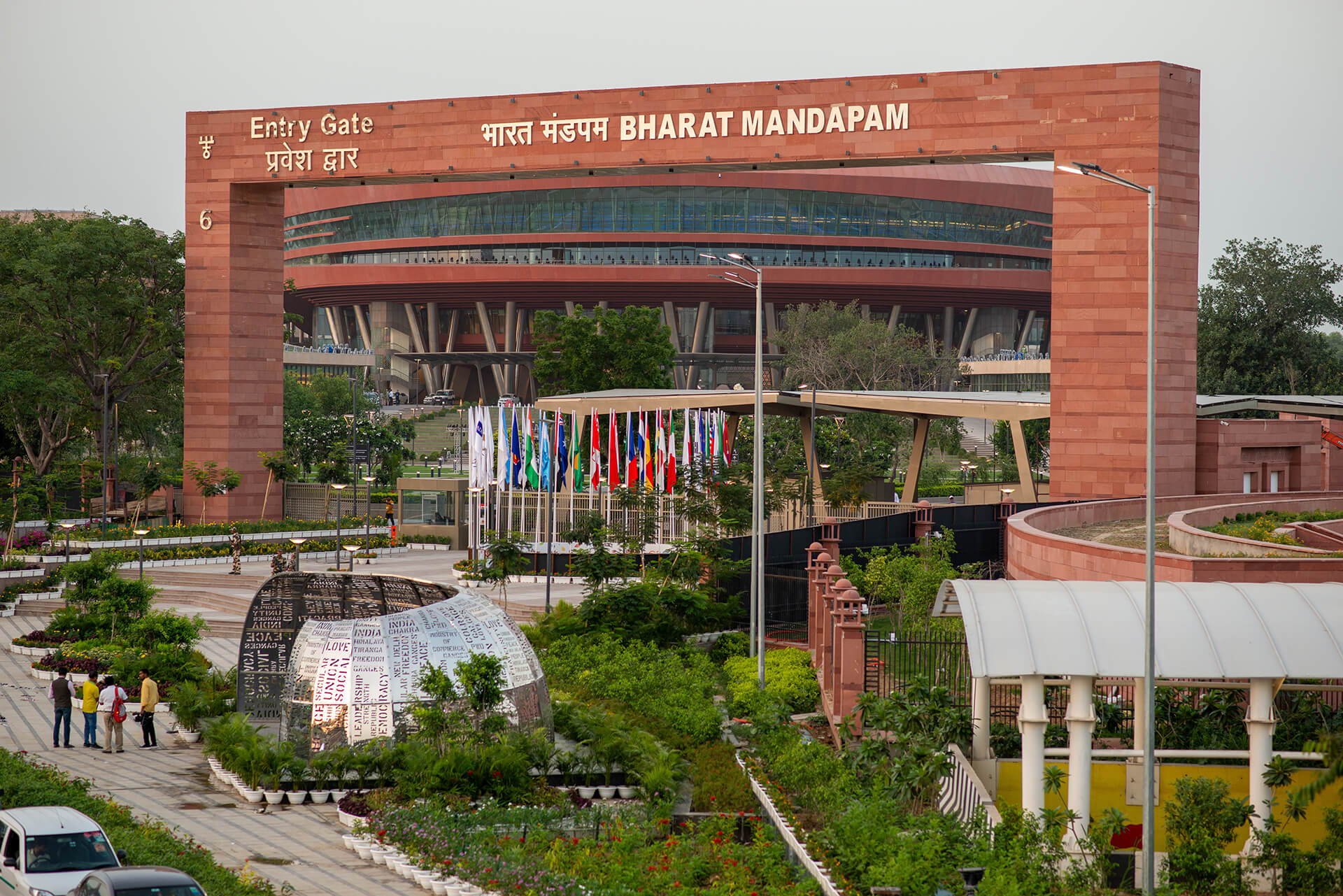Excitement is in the air as the countdown is finally over: One of the most significant global diplomatic events of the year, the G20 summit, is taking place from September 9–10. The G20 is an international forum that brings together governments and central bank governors from 19 nations and the European Union. Heads of state and world leaders will gather in New Delhi this year, as India holds the group’s presidency until November 31. It is all about “Vasudhaiva Kutumbakam” — “One Earth, One Family, One Future” — which is India’s theme for the year.
Indeed, the G20 summit in New Delhi carries significant diplomatic importance for India. It offers a prime opportunity for Prime Minister Narendra Modi and Minister of External Affairs Subrahmanyam Jaishankar to showcase India’s role on the global stage. Welcoming delegates from a multitude of member nations, including prominent figures like US President Joe Biden and UK Prime Minister Rishi Sunak, presents a substantial diplomatic undertaking for India. The absence of leaders such as Russian President Vladimir Putin and Chinese President Xi Jinping cannot go unnoticed, and it will be intriguing to observe the outcomes and agreements that emerge from this pivotal summit.
The absence of Xi is particularly noteworthy. Chinese Premier Li Qiang will instead attend the event. The snub is telling, given that India is one of China’s greatest regional rivals. Perhaps China is having trouble grappling with India’s economic growth and recent achievements in space exploration, including a historic landing on the moon’s South Pole. Xi’s decision could also spring from a desire to strengthen China’s role in the newly-expanded BRICS forum, where he appeared more comfortable during a recent summit. Or Xi may have been kept home to address China’s economic challenges, notably the precarious situation which saw one of the nation’s largest property developers on the verge of default.
Xi’s absence raises questions about China’s diplomatic strategy and global posture. It suggests a reluctance to engage in an event where he might face difficult inquiries regarding China’s economic trajectory, military activities concerning Taiwan and support for Russia following its invasion of Ukraine. This decision also adds to concerns among investors about the increasing unpredictability of China’s policies, with US Commerce Secretary Gina Raimondo recently noting that abrupt shifts in Chinese policy have made the nation appear nearly “uninvestable.”
India is a nation committed to democracy and multilateralism, and its presidency will be a significant milestone as it seeks to find practical global solutions for the benefit of all and embody the idea of Vasudhaiva Kutumbakam.
Will India’s G20 presidency leave an imprint on the forum’s global agenda? New Delhi is highly optimistic of a declaration with India’s clear stamp on it. India wants the G20 to be a group for the global public good and not just an economic cooperation body. Vasudhaiva Kutumbakam literally means “the world is a family,” and not just the human world, but the environment from plants and animals down to microorganisms.
India’s priorities at the G20
In more concrete terms, India’s goals at the summit are six:
— Green Development, climate finance and LiFE. India’s primaryfocus centers on combatting climate change, with a specific
emphasis on climate finance and technology. The nation is
dedicated to ensuring equitable energy transitions, particularly
for developing countries. India has introduced the Lifestyle for
Environment (LiFE) campaign, which champions eco-conscious
practices rooted in the country’s sustainable traditions. — Accelerated, inclusive and resilient growth. India aims to stimulate
growth that is both rapid and inclusive. This entails addressing
structural transformations in various sectors. Initiatives include
supporting small and medium-sized enterprises in global trade,
safeguarding labor rights and welfare, bridging the global skills
gap, and fostering inclusive agricultural value chains and food
systems. — Accelerating progress on SDGs. India is steadfast in its
commitment to achieving the targets outlined in the 2030
Agenda for Sustainable Development, with a particular emphasis
on mitigating the impact of the Covid pandemic. — Technological transformation and digital public infrastructure.
India seeks to promote a people-centric approach to technology.
It advocates for increased knowledge-sharing in critical areas
such as digital public infrastructure, financial inclusion and the
application of technology in sectors like agriculture and
education. — Multilateral institutions for the 21st century. India is actively
engaged in efforts to reform the multilateral system, aiming to
create a more accountable, inclusive, and representative
international framework capable of effectively addressing the
challenges of the 21st century. — Women-led development. In pursuit of inclusive growth and
development, India places a strong emphasis on empowering
women and ensuring their representation in various spheres.
This approach is designed to boost socio-economic
development and advance the achievement of Sustainable
Development Goals (SDGs).
What’s in it for India?
We’ve discussed the goals that India has for the world, but what will India itself gain from the not-inexpensive undertaking of hosting the G20 summit? Here is how India can potentially benefit from hosting and participating in G20 meetings:
— Economic cooperation. G20 meetings offer a vital platform forcountries to engage in discussions about economic matters, trade
policies and financial stability. India can actively participate in
these conversations to promote its economic interests and
engage in discussions on global economic policies. — Investment opportunities. Hosting a G20 meeting can serve as a
powerful showcase for India, presenting it as an attractive
destination for foreign investment. This exposure can lead
to increased foreign direct investment and the forging of
partnerships with other G20 nations, fostering economic
growth. — Policy influence. India has the opportunity to exert its influence on
the global policy agenda by participating in discussions on
crucial issues such as climate change, healthcare, and sustainable
development. These discussions have already been initiated in
various G20 working group meetings held across different cities
in India. — Diplomatic relations. Hosting such a prestigious event can
strengthen diplomatic relations between India and other G20
member countries. It can facilitate international cooperation and
collaboration on various fronts, including trade, security, and
global challenges. — Infrastructure development. Preparing for the G20 summit often
necessitates significant infrastructure development in the host
city. These investments can yield long-term benefits, such as
improved transportation systems, expanded hospitality facilities,
and a boost to the local tourism sector. — Showcasing culture. India can leverage the G20 event to showcase
its rich cultural heritage, tourist attractions, and exceptional
hospitality. This can serve as a powerful promotion of tourism in
the region, attracting visitors from around the world.
It’s crucial to acknowledge that the specific benefits India derives from hosting and participating in G20 meetings will depend on the agenda and outcomes of the summit, as well as how effectively India seizes the opportunity to advance its national interests and priorities on the global stage.
Key issues for the G20 to address
The summit comes at a fraught time in international relations, and there are some pressing issues that I believe the parties should address.
It is imperative for the forum to address the pressing sovereign debt crisis and explore measures aimed at alleviating poverty and reducing inequality on a global scale. One potential solution lies in the establishment of universal social protection systems, which can effectively promote social cohesion and bolster economic resilience. Collaborative efforts among governments, including India, hold the potential to make a substantial impact in these areas.
Another key item is banking reform. India, as reported by The Times of India, has been actively advocating for a reform of multilateral development banks. These banks include the World Bank and the Asian Development Bank. India seeks to realign the priorities of these institutions, moving beyond poverty alleviation to focus on financing climate change and other “global public goods.” This issue should feature prominently in the G20 agenda.
Leaders must engage in substantive conversations regarding increased loans to developing nations from multilateral institutions, the reform of international debt architecture, the regulation of cryptocurrencies and the assessment of how geopolitical uncertainties impact global food and energy security. These topics reflect the pressing global challenges that require collective attention and concerted action by the G20 nations.
With the upcoming summit scheduled at the newly constructed Bharat Mandapam convention center at Pragati Maidan in New Delhi, there will be regulated entry and exit in the capital. The world is closely watching how it goes.
[Anton Schauble edited this piece.]
The views expressed in this article are the author’s own and do not necessarily reflect Fair Observer’s editorial policy.
Support Fair Observer
We rely on your support for our independence, diversity and quality.
For more than 10 years, Fair Observer has been free, fair and independent. No billionaire owns us, no advertisers control us. We are a reader-supported nonprofit. Unlike many other publications, we keep our content free for readers regardless of where they live or whether they can afford to pay. We have no paywalls and no ads.
In the post-truth era of fake news, echo chambers and filter bubbles, we publish a plurality of perspectives from around the world. Anyone can publish with us, but everyone goes through a rigorous editorial process. So, you get fact-checked, well-reasoned content instead of noise.
We publish 2,500+ voices from 90+ countries. We also conduct education and training programs
on subjects ranging from digital media and journalism to writing and critical thinking. This
doesn’t come cheap. Servers, editors, trainers and web developers cost
money.
Please consider supporting us on a regular basis as a recurring donor or a
sustaining member.
Will you support FO’s journalism?
We rely on your support for our independence, diversity and quality.







Comment